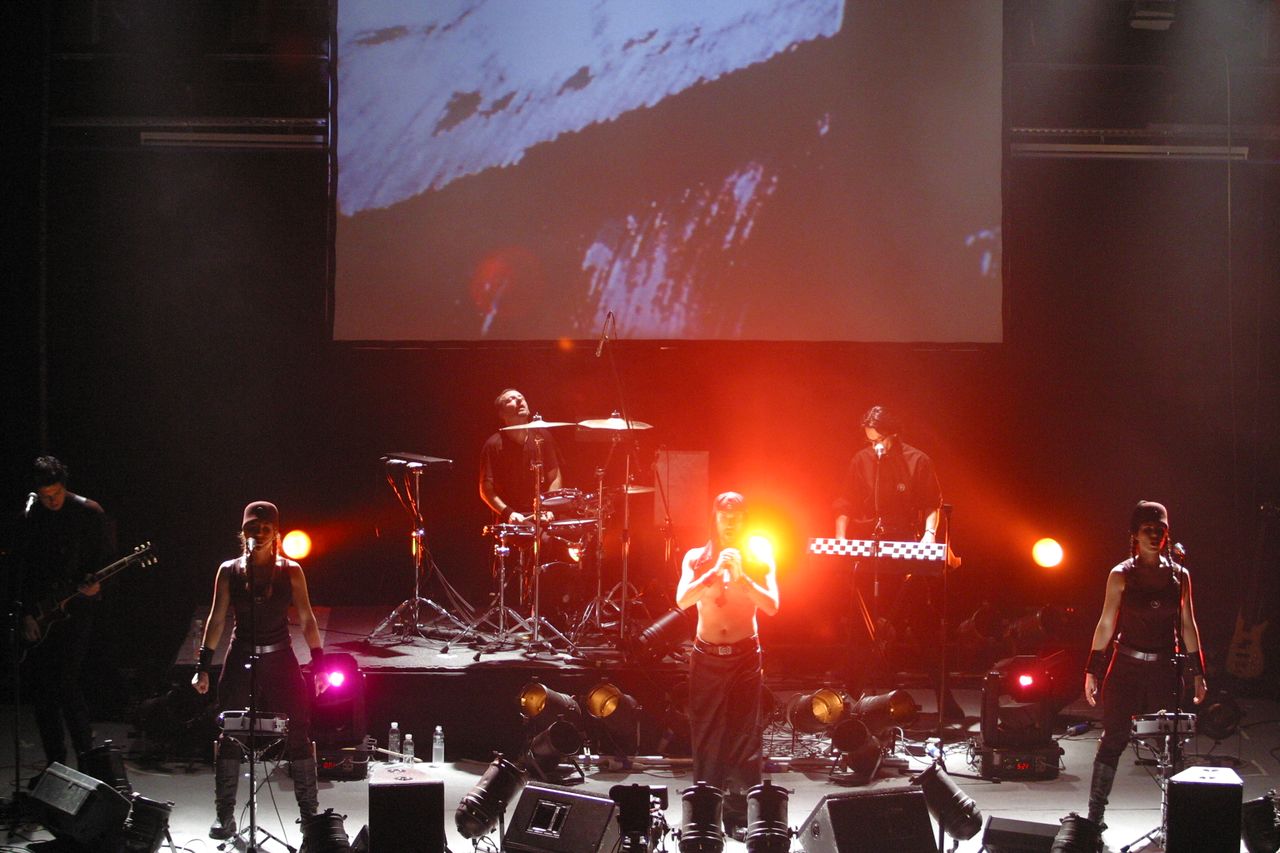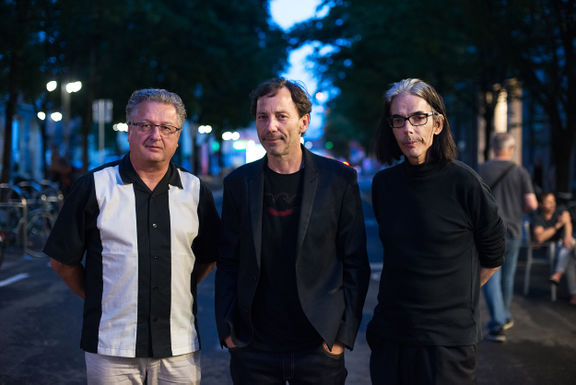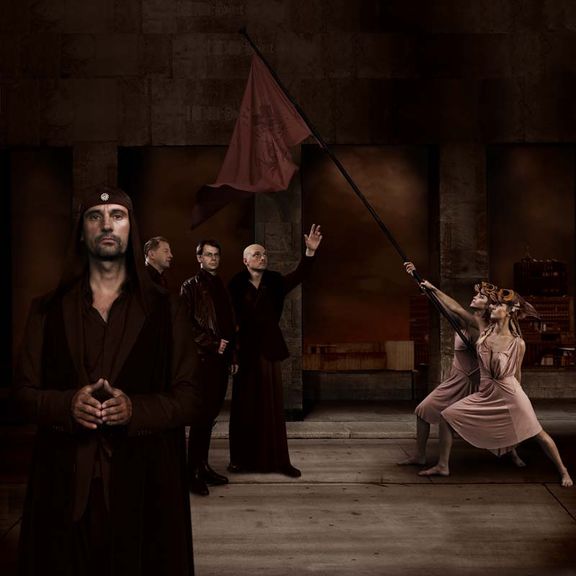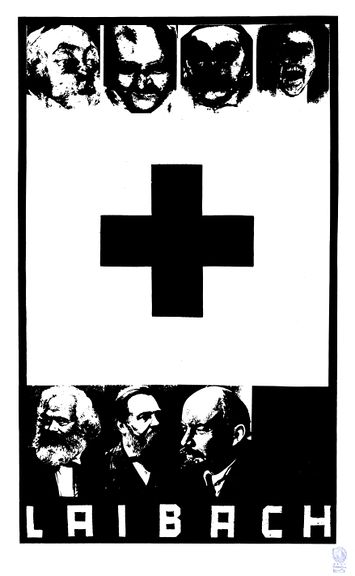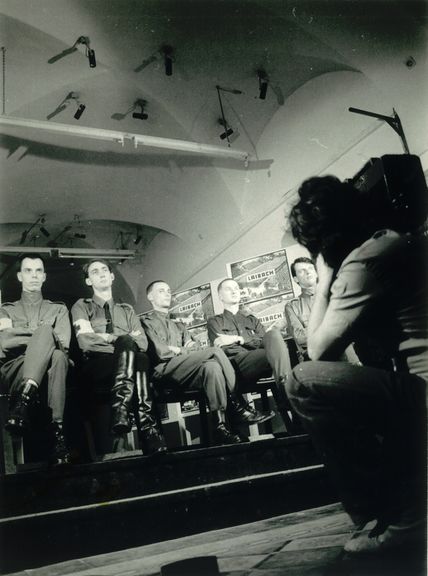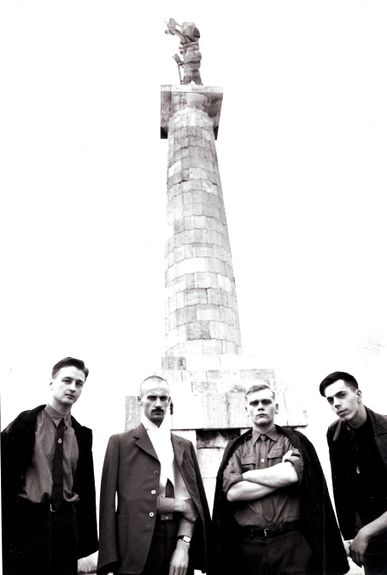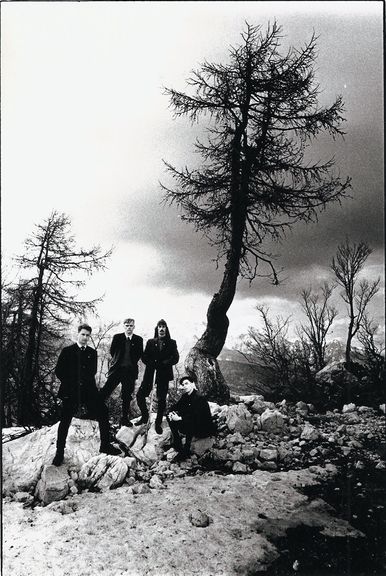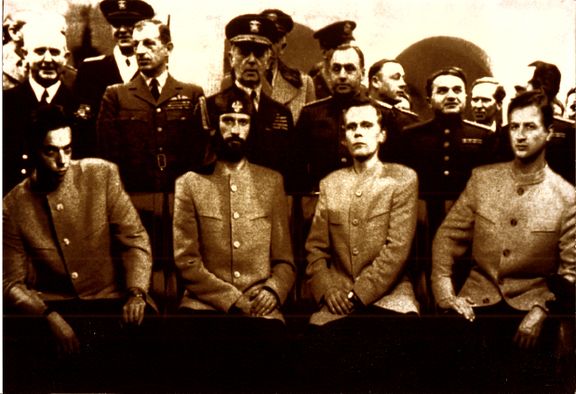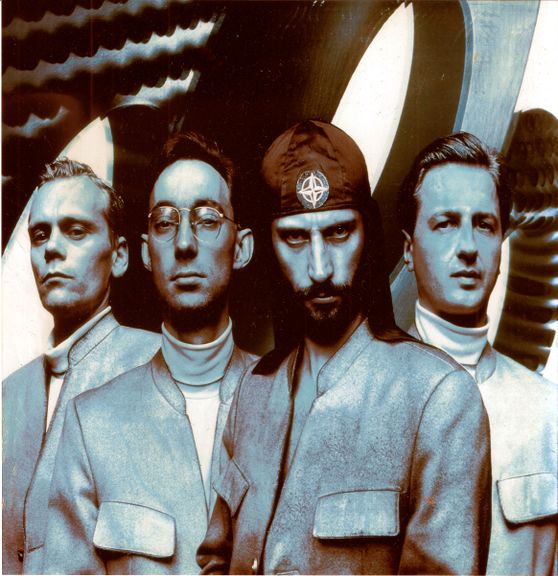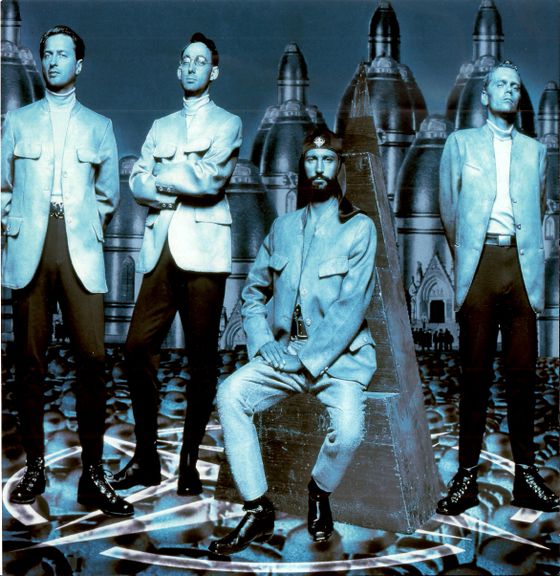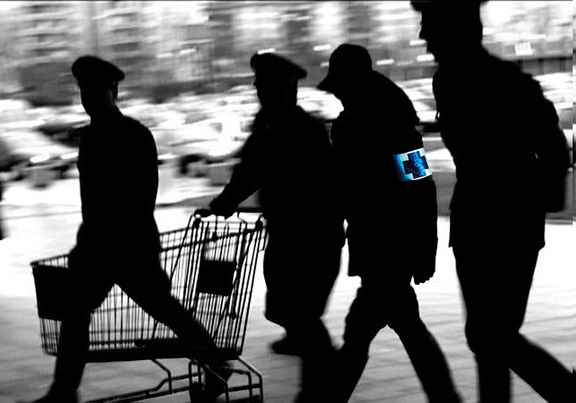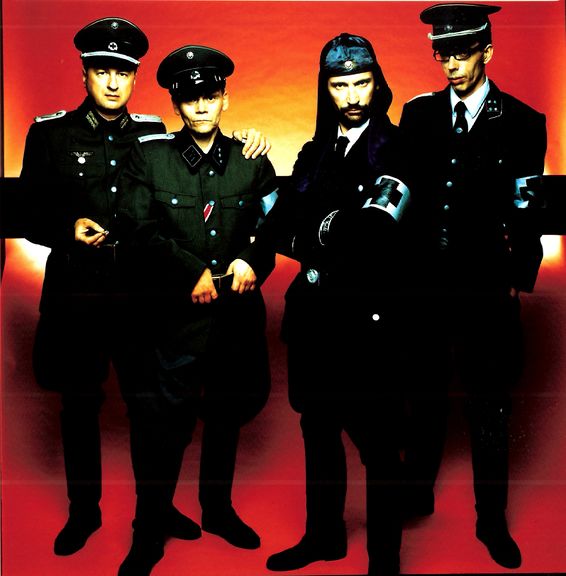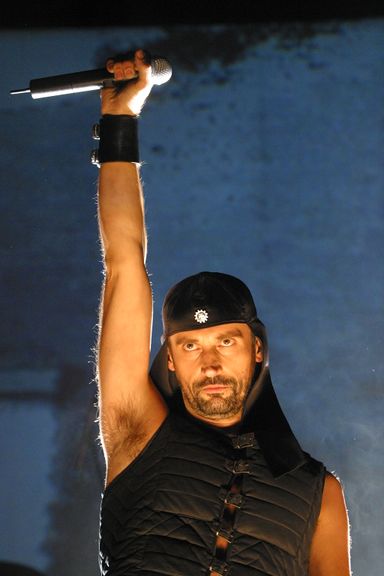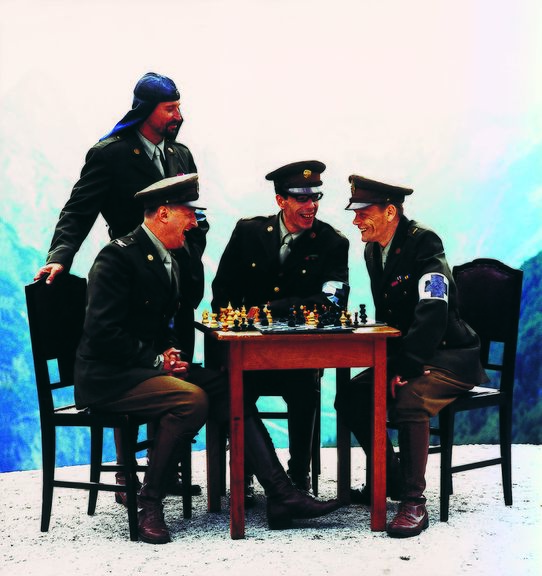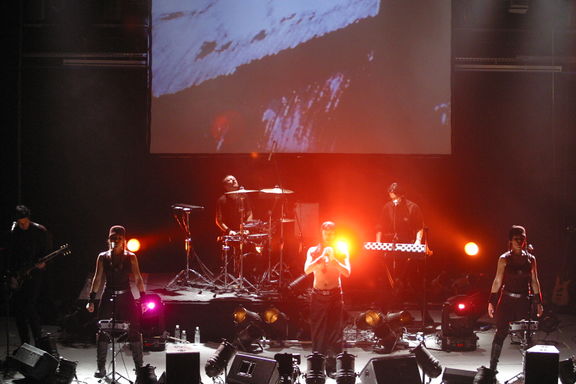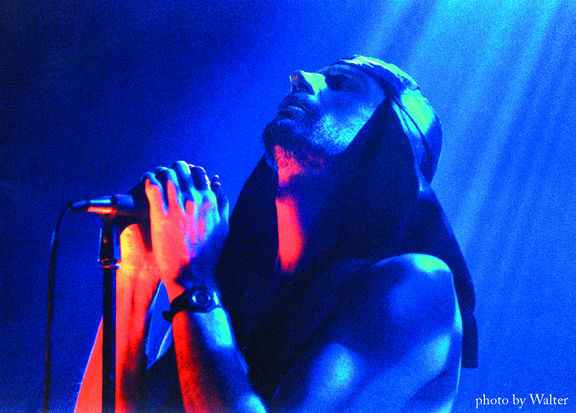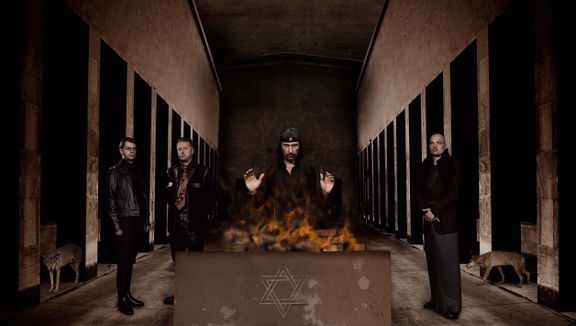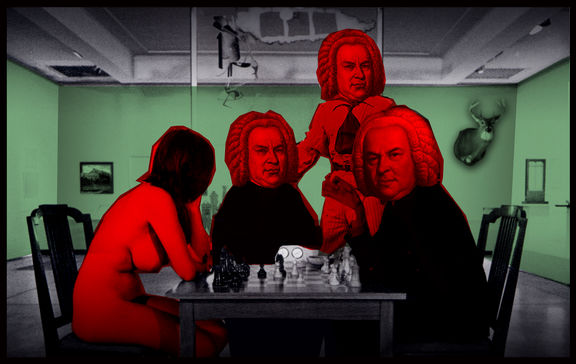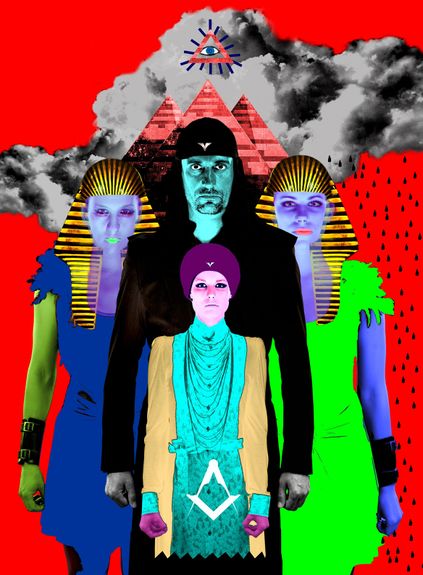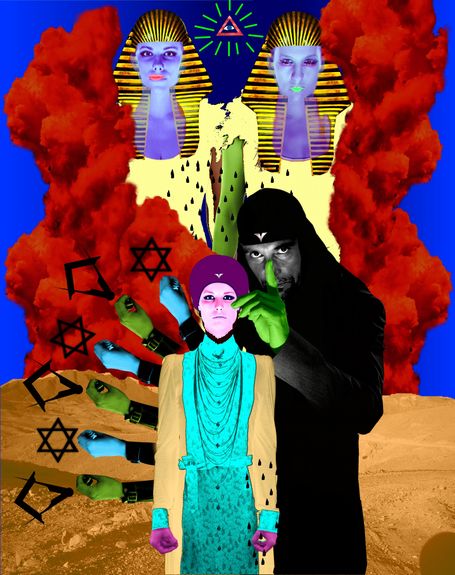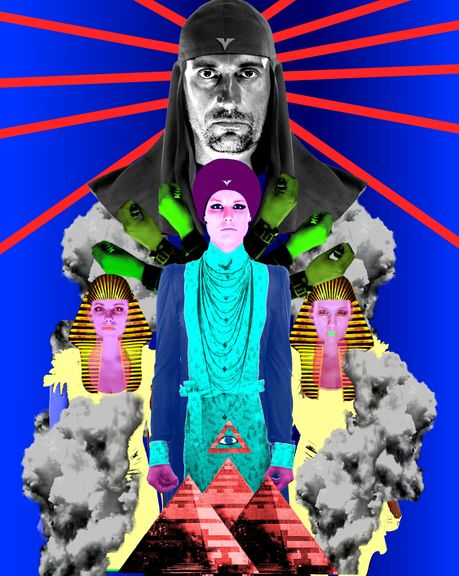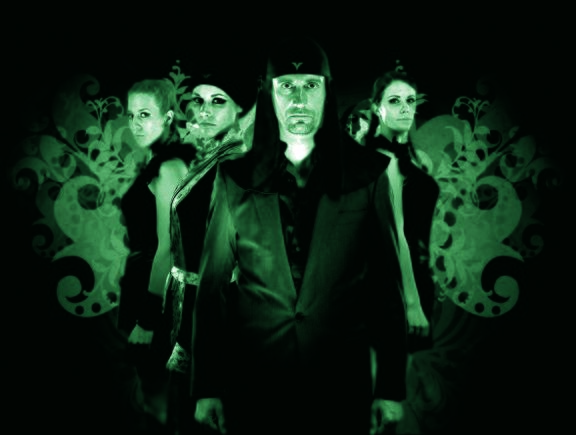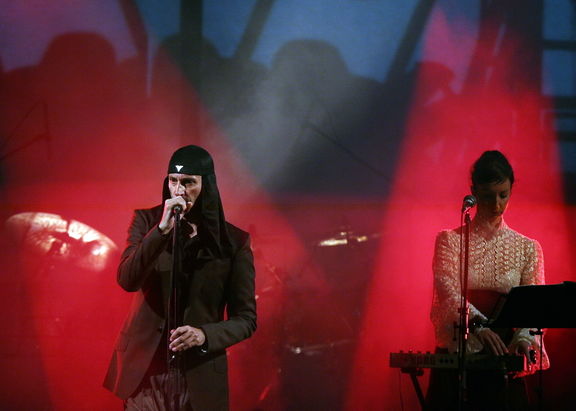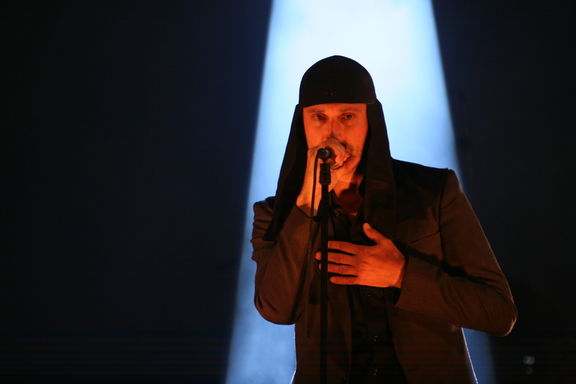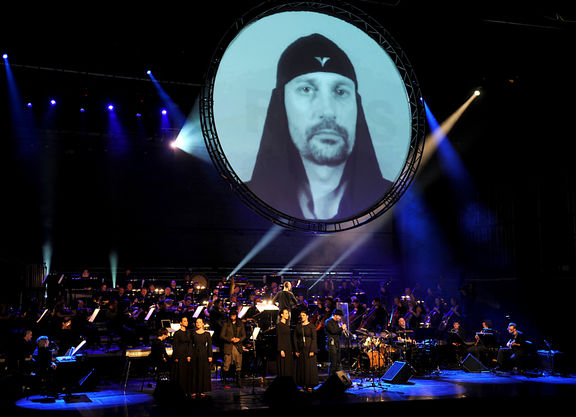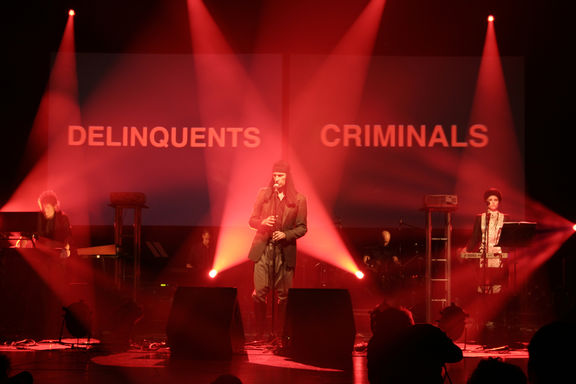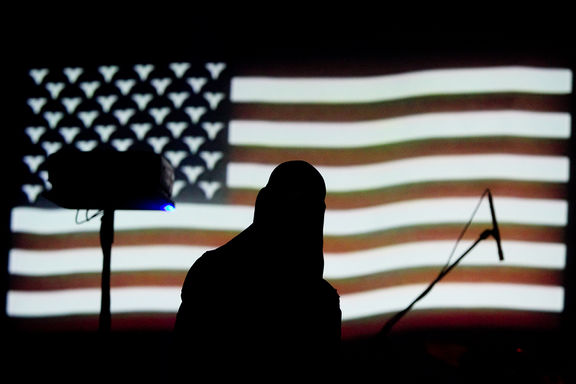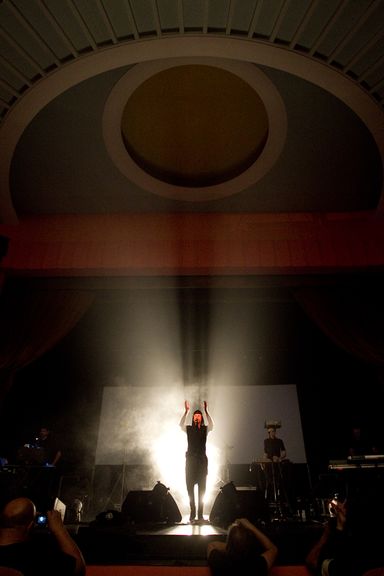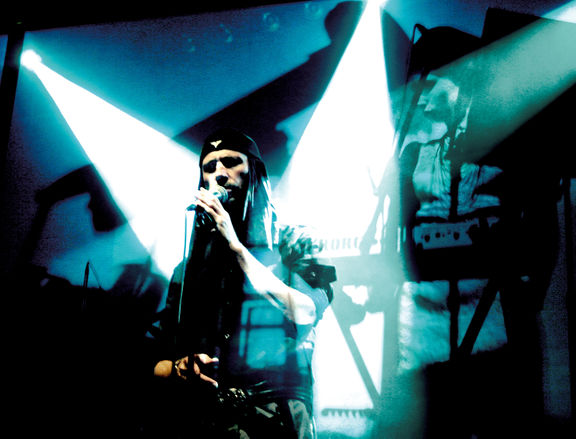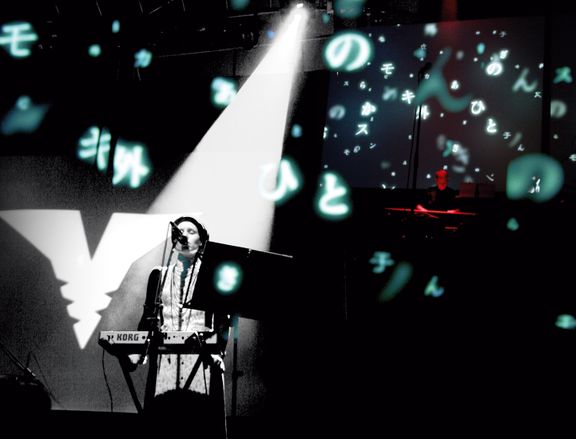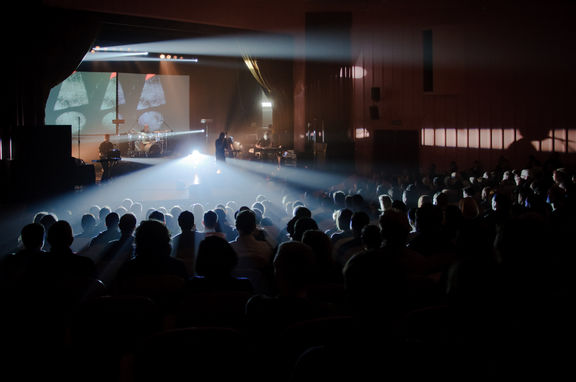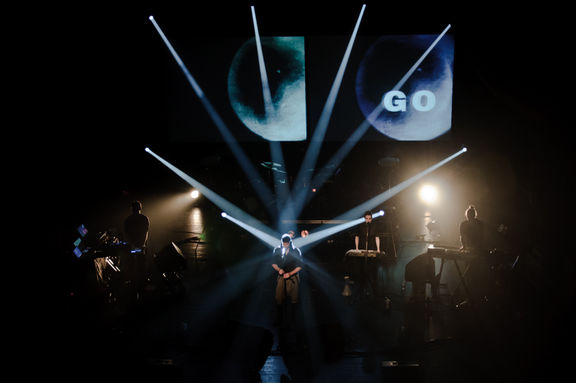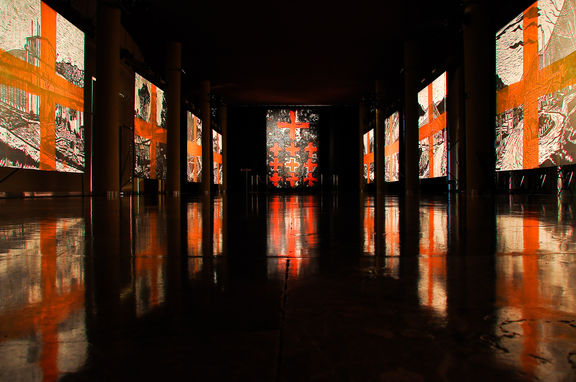-
14 May 2024
A live performance of the internationally acclaimed retro-avantgarde music group Laibach, as part of their "Opus Dei" tour.
-
to
15 May 2024
16 May 2024
-
17 May 2024
A live performance of the internationally acclaimed retro-avantgarde music group Laibach, as part of their "Opus Dei" tour.
-
to
18 May 2024
19 May 2024
-
to
30 Aug 2024
30 Sep 2024
The 6th international PrintMaking Biennial Čačak will be hosting Slovenia as the main guest country in the scope of the FOCUS-SLOVENIA project. The featured Slovene artists are the Laibach group, Marko Šajn, David Kucler, Mitja Stanek, Neža Jurman, Mladen Stropnik, Oliver Pilić, and Teodor Lovrenčić. The biennial is supported by Embassy of the Republic of Slovenia Belgrade.
at the PrintMaking Biennial Čačak
-
24 Apr 2024
A performance of "Saint Joan of the Stockyards - Sveta Ivana Klavniška", a Slovene production of Bertold Brecht's play by Mladinsko Theatre in collaboration with Cankarjev dom. Featuring music by Laibach and cast members from Slovenia, Italy, and Luxembourg. Coproduced by Emilia Romagna Teatro Bologna/Teatro Nazionale, TNL – Théâtre National du Luxembourg, ErosAntEros – POLIS Teatro Festival, and Teatro Stabile di Bolzano.
-
to
18 Apr 2024
21 Apr 2024
Four performances of "Saint Joan of the Stockyards - Sveta Ivana Klavniška", a Slovene production of Bertold Brecht's play by Mladinsko Theatre in collaboration with Cankarjev dom. Featuring music by Laibach and cast members from Slovenia, Italy, and Luxembourg. Coproduced by Emilia Romagna Teatro Bologna/Teatro Nazionale, TNL – Théâtre National du Luxembourg, ErosAntEros – POLIS Teatro Festival, and Teatro Stabile di Bolzano. The play premieres on the 18th of April.
-
19 Oct 2023
On the occasion of Slovenia – Guest of Honour Country at the Frankfurt Book Fair 2023, Laibach is presenting an original symphonic performance Alamut. In collaboration with RTV Slovenia Symphony Orchestra, Teherani choir Human Voice Ensemble, Gallina Vocal Group and female accordion orchestra AccordiOna.
at the Frankfurt Book Fair
-
13 Jul 2023
-
20 May 2023
Austria Klagenfurt/Celovec Burghof
-
9 May 2023
Bosnia and Herzegovina Sarajevo Narodno pozorište
-
14 Apr 2023
-
26 Jan 2023
-
22 Jan 2020
-
to
16 Jan 2020
17 Jan 2020
-
4 Dec 2019
-
22 Nov 2019
-
30 Sep 2019
-
7 Sep 2019
-
3 Aug 2019
-
to
15 Jun 2019
13 Jul 2019
The opening of the exhibition Forbidden Whispers. Laibach and North Korea, organised by Photon Gallery, featuring a concert by Laibach and the documentary Music is the Art of Time 3, LP film Laibach, directed by Igor Zupe (attending) and produced by Nord Cross Production, in the frame of Summer at MCA,
-
to
11 Jun 2019
12 Jun 2019
The screenings of Liberation Day, a documentary film about Laibach's 2015 North Korea concerts (Laibach's member Ivan Novak attending), co-produced by Staragara, and the opening of the exhibition Guardians of Paradise – Man and Masses in North Korea, featuring photo material of the concerts, supported by the Embassy of the Republic of Slovenia Tirana,
-
to
5 Jun 2019
7 Jun 2019
The screenings of the documentaries Music is the Art of Time 3, LP film Laibach and Music is the Art of Time 1, LP film Pankrti - No Fun, music videos for Laibach, and excerpts from the film Bachelors, all directed by Igor Zupe (attending), and Music is the Art of Time 2, LP film Buldozer - Spit Truth Into the Eyes, directed by Varja Močnik, all produced by Nord Cross Production, supported by the Embassy of the Republic of Slovenia Buenos Aires,
at the AL ESTE Film Festival
-
1 Dec 2018
The screening of Liberation Day, a documentary film about Laibach's 2015 North Korea concerts, co-produced by Staragara, supported by the Embassy of the Republic of Slovenia Tirana,
-
to
25 Nov 2018
1 Dec 2018
The performances The Idiots, directed by Nina Rajić Kranjac and produced by Mladinsko Theatre; Hero 2.0 by Uroš Kaurin and Vito Weis, produced by Moment Arts and Culture Association and En-Knap Productions; 365 Falls by Via Negativa; and a concert by Laibach,
at the Desiré Central Station
-
11 Oct 2018
-
to
11 Oct 2018
25 Nov 2018
NSK Rendez-Vous Grenoble, featuring an opening lecture by Borut Savski, the exhibition NSK State and Time (Slovenian art collective Neue Slowenische Kunst (NSK)) by Irwin, screenings of Liberation Day, a documentary about Laibach's 2015 North Korea concerts, co-produced by Staragara, supported by the Embassy of the Republic of Slovenia Paris,
-
to
20 Sep 2018
21 Sep 2018
Laibach perform their Sound of Music concert and Ivan Novak (Laibach) in conversation with the festival's curators, supported by the Slovenian Culture and Information Centre, Vienna (SKICA) (Embassy of the Republic of Slovenia Vienna),
at the Steirischer Herbst
-
9 Aug 2018
-
5 Aug 2018
-
to
7 Jun 2018
8 Jun 2018
Barbara Borčić (SCCA-Ljubljana Centre for Contemporary Arts) presents the project DIVA Station and two cases of Slovenian media/video practices (Miha Vipotnik and Laibach-Kunst) at the Revisiting Heritage conference
-
29 Mar 2018
-
to
29 Mar 2018
10 Apr 2018
-
27 Mar 2018
-
25 Mar 2018
-
23 Mar 2018
-
22 Mar 2018
-
20 Mar 2018
-
20 Mar 2018
-
19 Mar 2018
-
to
17 Mar 2018
18 Mar 2018
-
to
11 Mar 2018
14 Mar 2018
-
10 Mar 2018
-
to
4 Mar 2018
8 Mar 2018
-
3 Mar 2018
-
2 Mar 2018
-
24 Feb 2018
-
to
21 Feb 2018
22 Feb 2018
-
to
21 Feb 2018
25 Feb 2018
The P74 Centre and Gallery at ARCOmadrid International Contemporary Art Fair with Jože Barši and Laibach-Kunst
-
to
24 Nov 2017
26 Nov 2017
New Slovenian Cinema III programme, curated by Nataša Kramberger and featuring Liberation Day, a documentary film about Laibach's 2015 North Korea concerts, co-produced by Staragara, and short films selected by FeKK Ljubljana Short Film Festival, organised by Periskop and supported by the Embassy of the Republic of Slovenia Berlin,
-
23 Nov 2017
Laibach present their latest offering, Also Sprach Zarathustra, announced by the Embassy of the Republic of Slovenia London,
-
21 Sep 2017
-
to
12 Aug 2017
17 Aug 2017
Bosnia and Herzegovina Sarajevo Art Cinema Kriterion,Bosnian Cultural Centre,Cinemaplex Cinema City,Novi Grad Cinema,Sarajevo Youth Theatre,Sarajevsko Summer Screen
Screenings of The Family, a documentary directed by Rok Biček (Cvinger Film), Playing men, a documentary film written and directed by Matjaž Ivanišin (Nosorogi), and Ljubljana – München 15:27, directed by Katarina Morano (Academy of Theatre, Radio, Film and Television (AGRFT)), in the competition programme, Let Him Be a Basketball Player, directed by Boris Petkovič (Gustav Film), Koyaa – The Freezing Scarf, Koyaa – Naughty Toy Car and Koyaa – Wild Sunbed, directed by Kolja Saksida (ZVVIKS, Institute for Film and Audiovisual Production), in the children’s programme, Liberation Day, a documentary film about Laibach's 2015 North Korea concerts, co-produced by Staragara, in the summer screen programme, and a concert by Laibach, Halfsister, directed by Damjan Kozole (Vertigo), at Cinelink Industry Days, and director Simon Intihar, producer Nastja Kotnik and screenwriter Anja Bunderla at Talents Sarajevo
at the Sarajevo Film Festival
-
27 Jul 2017
-
to
26 Jul 2017
29 Jul 2017
Screenings of Every Good Story Is a Love Story, a documentary directed by Rajko Grlić and Matjaž Ivanišin and produced by Vertigo and NP 7 in cooperation with NuFrame and Sinhro Studio 100, The Invisible Hand of Adam Smith, directed by Slobodan Maksimović, You Didn't Forget, directed by Simon Intihar, Lp Film Buldožer – Spit Truth in the Eye, directed by Varja Močnik, Liberation Day, a documentary film about Laibach's North Korea concerts in 2015, and a concert by Laibach
at the Motovun Film Festival
-
to
19 Jul 2017
21 Jul 2017
A concert by Laibach and A Report on the Blind with John Malkovich, pianist Anastasya Terenkova and violinist Lana Trotovšek
at the Mittelfest
-
to
17 Jun 2017
18 Jun 2017
The Republic of Slovenia, produced by the Mladinsko Theatre and Maska Institute, My Name is Janez Janša, a film screening and the 350 Janez Janša Bottles project presentation, Bojana Kunst's lecture and book presentation (Artist at Work) and a concert by Laibach
at the Malta Festival Poznań
-
to
7 Jun 2017
13 Jun 2017
A screening of Liberation Day, a documentary film about Laibach's North Korea concerts in 2015, supported by the Embassy of the Republic of Slovenia Canberra,
at the Sydney Film Festival
-
to
11 May 2017
20 May 2017
Screenings of Liberation Day and a concert by Laibach
at the Docaviv Tel Aviv International Documentary Film Festival
-
9 May 2017
-
1 May 2017
A screening of Liberation Day and a performance by Laibach
at the Jeonju International Film Festival
-
19 Apr 2017
-
19 Nov 2016
A screening of Liberation Day followed by a live performance by Laibach at the International Film Festival Amsterdam
-
to
10 Nov 2016
7 May 2017
Cold Front from the Balkans, an exhibition co-curated by Alenka Gregorič (City Art Gallery Ljubljana) also featuring works by Irwin, Laibach, the OHO Group, Jasmina Cibic, and Mark Požlep,
-
27 Aug 2016
-
to
20 Aug 2016
28 Aug 2016
-
23 Apr 2016
-
22 Apr 2016
-
20 Apr 2016
-
19 Apr 2016
-
to
15 Apr 2016
17 Apr 2016
The Sound of Music Tour by Laibach, supported by the Consulate General of the Republic of Slovenia Munich,
-
14 Apr 2016
-
12 Apr 2016
-
10 Apr 2016
-
9 Apr 2016
-
8 Apr 2016
-
to
6 Apr 2016
7 Apr 2016
-
9 Feb 2016
A concert by Laibach with the RTV Slovenia Symphony Orchestra, supported by the Embassy of the Republic of Slovenia Brussels,
-
19 Aug 2015
-
6 Aug 2015
-
31 Jul 2015
-
to
27 Jun 2015
11 Jul 2015
-
to
15 May 2015
27 May 2015
A tour of North America by Laibach in promotion of their latest album Spectre, supported by the Embassy of the Republic of Slovenia Ottawa,
-
to
11 May 2015
1 Jun 2015
USA Chicago,Englewood,Indianapolis,Los Angeles,New York,Omaha,Philadelphia,Pittsburgh,Portland,San Francisco,Seattle,Washington
A tour of North America by Laibach in promotion of their latest album Spectre, supported by the Embassy of the Republic of Slovenia Washington,
-
8 Apr 2015
A concert by Laibach, supported by the Slovenian Culture and Information Centre, Vienna (SKICA), Embassy of the Republic of Slovenia Vienna,
-
5 Apr 2015
-
28 Mar 2015
-
27 Mar 2015
-
12 Dec 2014
-
to
9 Dec 2014
11 Dec 2014
-
8 Dec 2014
-
7 Dec 2014
-
6 Dec 2014
-
5 Dec 2014
-
to
14 Nov 2014
15 Feb 2015
Turning Points, an exhibition also presenting the video production of Laibach, supported by the Embassy of the Republic of Slovenia Budapest,
-
24 Oct 2014
-
13 Sep 2014
-
5 Sep 2014
-
23 Aug 2014
-
26 Jul 2014
-
to
16 Jun 2014
30 Jun 2014
Fourteen, a dance performance by Rosana Hribar and Gregor Luštek (Dance Theatre Ljubljana), Sad Sam Lucky, a dance performance by Matija Ferlin (Emanat Institute), a concert by Laibach, Postgravity Art: Cosmistic Architectre, a theatre informance by Dragan Živadinov, Dunja Zupančič, Miha Turšič, Dario Seraval, and Špela Petrič (Cultural Centre of European Space Technologies (KSEVT)), and Postgravity Art: Infomatrix, a visual informance by Dragan Živadinov, Dunja Zupančič, and Miha Turšičat (Cultural Centre of European Space Technologies (KSEVT)), at the IKS International Festival of Contemporary Theatre
-
14 Jun 2014
-
22 May 2014
-
21 May 2014
-
9 May 2014
A concert by Laibach in the framework of the world tour promoting the release of the new album Spectre
-
to
17 Apr 2014
18 Apr 2014
Concerts by Laibach in the framework of the world tour promoting the release of the new album Spectre
-
16 Apr 2014
A concert by Laibach in the framework of the world tour promoting the release of the new album Spectre
-
15 Apr 2014
-
to
12 Apr 2014
13 Apr 2014
Concerts by Laibach in the framework of the world tour promoting the release of the new album Spectre
-
11 Apr 2014
-
10 Apr 2014
A concert by Laibach in the framework of the world tour promoting the release of the new album Spectre
-
to
4 Apr 2014
8 Apr 2014
-
to
2 Apr 2014
3 Apr 2014
Concerts by Laibach in the framework of the world tour promoting the release of the new album Spectre
-
22 Mar 2014
A concert by Laibach in the framework of the world tour promoting the release of the new album Spectre, accompanied by an exhibition and a seminar,
-
to
14 Mar 2014
16 Mar 2014
-
13 Mar 2014
A concert by Laibach in the framework of the world tour promoting the release of the new album Spectre
-
12 Mar 2014
A concert by Laibach in the framework of the world tour promoting the release of the new album Spectre
-
10 Mar 2014
A concert by Laibach in the framework of the world tour promoting the release of the new album Spectre
-
8 Mar 2014
-
7 Mar 2014
-
6 Mar 2014
-
1 Dec 2013
-
30 Nov 2013
-
28 Nov 2013
-
21 Nov 2013
-
17 Oct 2013
-
to
21 Sep 2013
21 Nov 2013
Was ist Kunst?, a joint exhibition also featuring works by Slovene artists Marina Gržinić/Aina Šmid, Irwin, Laibach, OHO, Marko Pogačnik, and Sašo Sedlaček
at the Steirischer Herbst
-
to
14 Jun 2013
13 Jul 2013
-
to
23 May 2013
16 Jun 2013
-
to
26 Apr 2013
26 Sep 2013
-
17 Nov 2012
-
to
7 Nov 2012
8 Dec 2012
-
21 Sep 2012
-
20 Sep 2012
-
to
18 Sep 2012
19 Sep 2012
-
17 Sep 2012
-
16 Sep 2012
-
15 Sep 2012
-
to
10 Sep 2012
13 Sep 2012
-
9 Sep 2012
-
8 Sep 2012
-
9 Jun 2012
-
6 Jun 2012
A concert by Laibach following the screening of the Iron Sky
at the Transivlania International Film Festival
-
9 May 2012
-
14 Apr 2012
Neue Slowenische Kunst (1984 - 1992): A Historical Perspective Symposium and Laibach gig in the Turbine Hall
-
to
10 Apr 2012
12 Apr 2012
United Kingdom Birmingham,Glasgow,Manchester Classic Grand,Manchester Academy,The Institute
-
8 Apr 2012
-
7 Apr 2012
-
5 Apr 2012
-
4 Apr 2012
-
to
1 Apr 2012
3 Apr 2012
-
29 Mar 2012
-
to
26 Mar 2012
27 Mar 2012
-
to
20 Mar 2012
21 Apr 2012
Neue Slowenische Kunst 1984-1992 exhibition curated by Michele Drascek, presenting Laibach, Irwin, Novi kolektivizem (NK) and Scipion Nasice Sisters Theatre
-
to
16 Mar 2012
20 May 2012
Art Histories exhibition curated by Marie-Josée Jean featuring also Marina Gržinić and Aina Šmid, Irwin and Laibach
History
Established in Trbovlje, a coal mining industrial town in the centre of Slovenia, Laibach launched their first multimedia project Rdeči revirji (Red Districts) in the same year, a project designed to challenge the striking contradictions of the political structure of the town at that time. The project was banned before it opened, preventing the first public appearance of the group, though not the angry media response which followed. Laibach appeared again in 1982 with their first concert in Ljubljana. Next followed concerts around Yugoslavia (Zagreb, Belgrade) and a headlining appearance at the New Rock [Novi Rock] Festival in Križanke in the centre of Ljubljana. On 23 June 1983 the group made its first television appearance with an interview on the political news programme TV Tednik. The interview provoked numerous reactions, and was followed by an administrative political ban on public appearances and the use of the name Laibach.
November and December 1983 saw the first European tour by the group, the Occupied Europe Tour, which also featured the British group Last Few Days. The 17-date tour covered 16 cities in eight countries in Eastern and Western Europe. After their performance in Warsaw the then ambassador of socialist Yugoslavia made a declaration which seems the most concise characterisation of Laibach's performances ever, saying: "This is a completely adequate presentation of the history of the Yugoslav nations."
The group made a successful anonymous appearance at the Malči Belič Hall, Ljubljana in December 1984. In the same year Laibach became a founding member of the Neue Slowenische Kunst (NSK) art collective.
Recent projects
Recent projects of the veteran band with its constant changing personnel include fine and conceptually skewed remakes of (imperial) national anthems (album Volk) and a loose reinterpretation of Johann Sebastian Bach's The Art of Fugue.
On 18 September 2009 the Kino Šiška, a new centre of urban culture was inaugurated in Ljubljana with a concert by Laibach and the British Juno Reactor.
The Red District Symposium and the Laibach Kunst 1980–2010 exhibition in Delavski dom Trbovlje Cultural Centre was followed by the First NSK Citizens’ Congress at Haus der Kulturen der Welt in Berlin in October.
Recent exhibitions
In 2009 a retrospective exhibition Ausstellung Laibach Kunst - Recapitulation 2009 was shown at Muzeum Sztuki in Łódź, confronting archival and recent material.
The International Centre of Graphic Arts, Ljubljana set up the exhibition GESAMTKUNST LAIBACH, Fundamentals 1980–1990, opened from 15 April to 6 June 2010, which presented the group's visual artworks (posters, album covers, fanzines, linocuts, xeroxes, paintings and installations) as well as the controversial TV interview from 1983 and other documentary material.
30 years after the Laibach's first (and than banned) exhibition, the group set the exhibition up at the same place in Laibach’s home town Trbovlje.
Releases
Laibach's first album Laibach was released in April 1985 on the Slovene ŠKUC Ropot label. However, because of the ban the record came out without the group's name; instead the cover featured a symbol that was Laibach’s trademark. Its second and third albums Rekapitulacija 1980–1984 (1985) and Neu Konservatiw (1985) were the first of the group's records to gain an international release. Following Nova Akropola, Laibach's 1986 album for British independent Cherry Red, the group was signed by London-based Mute Records. Opus Dei, released in Spring 1987, was the first album on this new label.
The band's discography since 1987 includes Slovenska Akropola (1987), Krst Pod Triglavom-Baptism (1987), Let It Be (Mute Records, 1988), Sympathy for the Devil (Mute Records, 1988), Macbeth (Mute Records, 1990), Kapital (Mute Records, 1992), Ljubljana-Zagreb-Beograd (The Grey Area/Mute Records, 1993), NATO (Mute Records, 1994), The Occupied Europe NATO Tour 1994-1995 (The Grey Area/Mute Records, 1996), Jesus Christ Superstars (The Grey Area/Mute Records, 1996), Malči Belič, December 21, 1984 (The Grey Area/Mute Records, 1997), The John Peel Sessions (Strangefruit, 2002), WAT (Mute Records, 2003), Anthems (Mute Records, 2004, compilation), Volk (Mute Records, 2006), and Volk Tour London CC Club (Live Here Now, Mute Records, 2007) and LAIBACHKUNSTDERFUGE (Dallas Records/Mute Records, 2008).
See also
External links
- Laibach website
- Laibach on Myspace
- Laibach channel on YouTube
- The unofficial Laibach website
- WTC Laibach online shop
- NSK State website
- References
- Laibach on Wikipedia
- Laibach on IMDb
- On the Gesamtkunst Laibach Fundamentals 1980–1990 exhibition in International Centre of Graphic Arts, Ljubljana (2010)
- Laibach lecture at The Influencers Festival 2008
- Article "Laibach in Toronto" published in The Slovenian 2004




